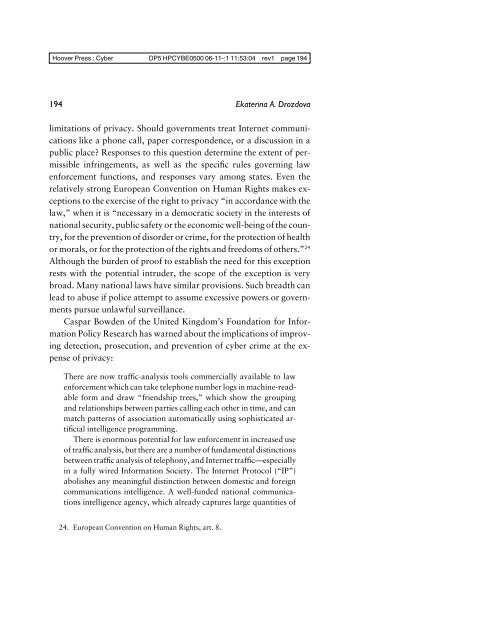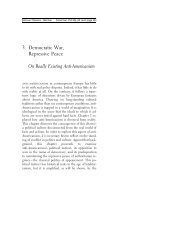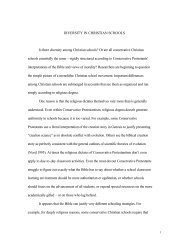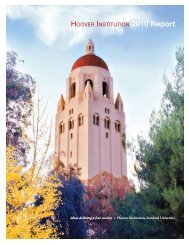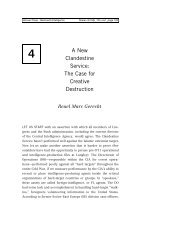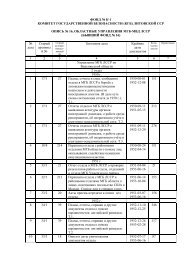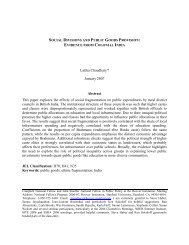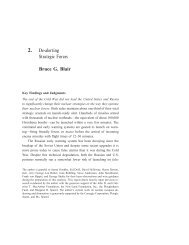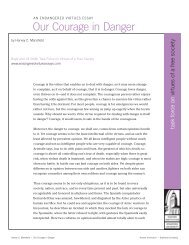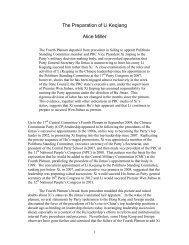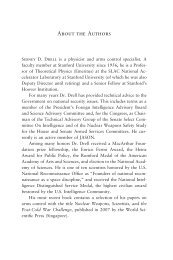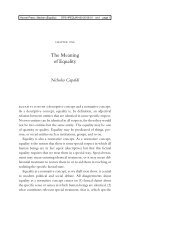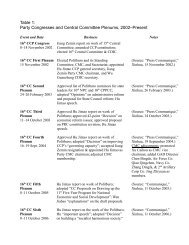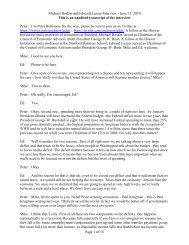Civil Liberties and Security in Cyberspace - Hoover Institution
Civil Liberties and Security in Cyberspace - Hoover Institution
Civil Liberties and Security in Cyberspace - Hoover Institution
You also want an ePaper? Increase the reach of your titles
YUMPU automatically turns print PDFs into web optimized ePapers that Google loves.
<strong>Hoover</strong> Press : Cyber DP5 HPCYBE0500 06-11-:1 11:53:04 rev1 page 194<br />
194 Ekater<strong>in</strong>a A. Drozdova<br />
limitations of privacy. Should governments treat Internet communications<br />
like a phone call, paper correspondence, or a discussion <strong>in</strong> a<br />
public place? Responses to this question determ<strong>in</strong>e the extent of permissible<br />
<strong>in</strong>fr<strong>in</strong>gements, as well as the specific rules govern<strong>in</strong>g law<br />
enforcement functions, <strong>and</strong> responses vary among states. Even the<br />
relatively strong European Convention on Human Rights makes exceptions<br />
to the exercise of the right to privacy “<strong>in</strong> accordance with the<br />
law,” when it is “necessary <strong>in</strong> a democratic society <strong>in</strong> the <strong>in</strong>terests of<br />
national security, public safety or the economic well-be<strong>in</strong>g of the country,<br />
for the prevention of disorder or crime, for the protection of health<br />
or morals, or for the protection of the rights <strong>and</strong> freedoms of others.” 24<br />
Although the burden of proof to establish the need for this exception<br />
rests with the potential <strong>in</strong>truder, the scope of the exception is very<br />
broad. Many national laws have similar provisions. Such breadth can<br />
lead to abuse if police attempt to assume excessive powers or governments<br />
pursue unlawful surveillance.<br />
Caspar Bowden of the United K<strong>in</strong>gdom’s Foundation for Information<br />
Policy Research has warned about the implications of improv<strong>in</strong>g<br />
detection, prosecution, <strong>and</strong> prevention of cyber crime at the expense<br />
of privacy:<br />
There are now traffic-analysis tools commercially available to law<br />
enforcement which can take telephone number logs <strong>in</strong> mach<strong>in</strong>e-readable<br />
form <strong>and</strong> draw “friendship trees,” which show the group<strong>in</strong>g<br />
<strong>and</strong> relationships between parties call<strong>in</strong>g each other <strong>in</strong> time, <strong>and</strong> can<br />
match patterns of association automatically us<strong>in</strong>g sophisticated artificial<br />
<strong>in</strong>telligence programm<strong>in</strong>g.<br />
There is enormous potential for law enforcement <strong>in</strong> <strong>in</strong>creased use<br />
of traffic analysis, but there are a number of fundamental dist<strong>in</strong>ctions<br />
between traffic analysis of telephony, <strong>and</strong> Internet traffic—especially<br />
<strong>in</strong> a fully wired Information Society. The Internet Protocol (“IP”)<br />
abolishes any mean<strong>in</strong>gful dist<strong>in</strong>ction between domestic <strong>and</strong> foreign<br />
communications <strong>in</strong>telligence. A well-funded national communications<br />
<strong>in</strong>telligence agency, which already captures large quantities of<br />
24. European Convention on Human Rights, art. 8.


